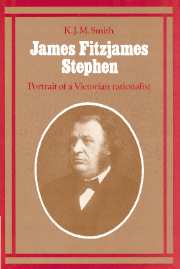Book contents
- Frontmatter
- Contents
- Preface
- 1 EARLY IMPRESSIONS: SIR JAMES, ETON AND CAMBRIDGE
- 2 A CONTROVERSIALIST IN THE MAKING: LITERARY CRITICISM AND LEADER-WRITING
- 3 A SCIENCE OF CRIMINAL LAW
- 4 ‘LAW LIVING AND ARMED’ – THE MECHANISM OF ENFORCEMENT
- 5 THE THREAT OF ‘HOOFS AND HOBNAILS’
- 6 INDIA AND THE IMPERIAL ETHIC
- 7 LIBERTY, EQUALITY, FRATERNITY: REFUTATION AND APOLOGIA
- 8 RATIONALISM'S BURDEN
- 9 THE BENCH AND BEYOND
- Notes
- Bibliography
- Index
6 - INDIA AND THE IMPERIAL ETHIC
Published online by Cambridge University Press: 30 September 2009
- Frontmatter
- Contents
- Preface
- 1 EARLY IMPRESSIONS: SIR JAMES, ETON AND CAMBRIDGE
- 2 A CONTROVERSIALIST IN THE MAKING: LITERARY CRITICISM AND LEADER-WRITING
- 3 A SCIENCE OF CRIMINAL LAW
- 4 ‘LAW LIVING AND ARMED’ – THE MECHANISM OF ENFORCEMENT
- 5 THE THREAT OF ‘HOOFS AND HOBNAILS’
- 6 INDIA AND THE IMPERIAL ETHIC
- 7 LIBERTY, EQUALITY, FRATERNITY: REFUTATION AND APOLOGIA
- 8 RATIONALISM'S BURDEN
- 9 THE BENCH AND BEYOND
- Notes
- Bibliography
- Index
Summary
Between 1855 and 1869 Stephen poured out a great volume of articles, initially in a variety of journals and latterly in the Pall Mall Gazette. Yet wide-ranging success and an enviable reputation in higher journalism were not matched by an equally steep ascent in his career at the Bar. Certainly the normal signposts of progress soon appeared, with a Recordership at Newark in 1859 and the taking of silk in 1868. However, not onl had the steady gale of absorbing and lucrative work refused to blow, but Stephen was also experiencing an increasing restlessness and desire for involvement in something of greater substance than life on circuit – despite its promise of eventual high financial reward. The opening of 1869 had brought some disappointment when he failed to secure election to Cambridge's Whewell Chair of International Law, with victory going to his old rival Vernon Harcourt; although of the six electors Stephen received the votes of the Millite Henry Fawcett and theologian F. D. Maurice. Therefore when the possibility of legislative work in India turned up Stephen was fairly receptive to the scheme.
Quite when he was first alerted to the chance of replacing Maine as Legal Member of the Viceroy's Council is unclear. Stephen was formally offered the position by the Duke of Argyll, Secretary of State for India, in July 1869; although Leslie Stephen recalls that Maine had approached his brother the previous year.
- Type
- Chapter
- Information
- James Fitzjames StephenPortrait of a Victorian Rationalist, pp. 123 - 159Publisher: Cambridge University PressPrint publication year: 1988

